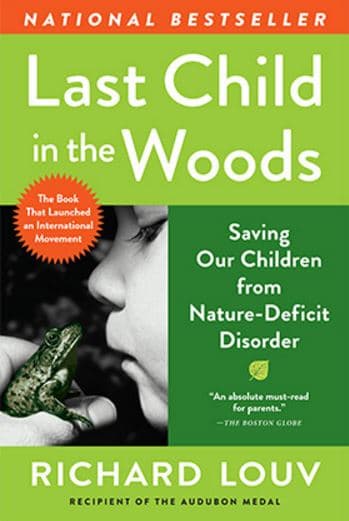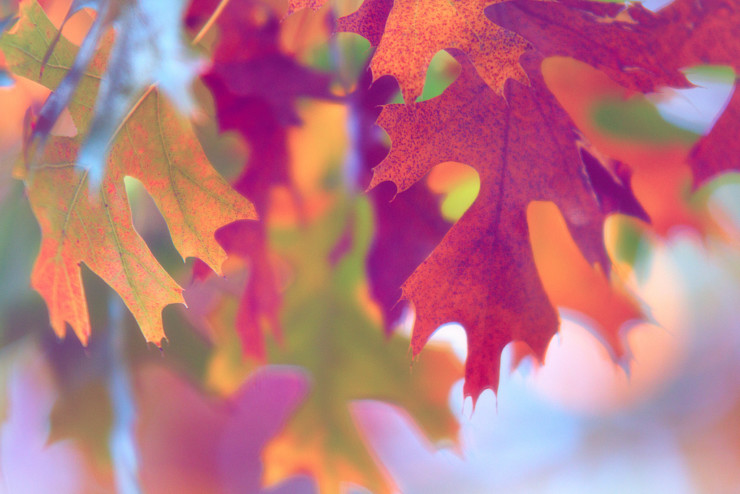I was, once, the last child in the woods. Literally. I’d managed to separate myself from the rest of my class on a 3rd-grade field trip to the local nature center (mostly on account of holding back on the trail because of the odds of encountering poison ivy or snakes in the area my friends were exploring). An unfriendly teacher found me later, still waiting for my companions to reemerge from the foliage, and sent me back to school on another bus, my classmates already having left the area.
That is probably not what Richard Louv means by Last Child in the Woods, his book that “explores the increasing divide between the young and the natural world, and the environmental, social, psychological, and spiritual implications of that change” and “also describes the accumulating research that reveals the necessity of contact with nature for the healthy child—and adult—development.” Even so, it might be meant for someone like me.
It would not be untrue to say I am not an outdoorsy type of person. It’s not that I am opposed to the outdoors (with the exception of snakes and poison ivy). I spent a lot of time playing in the woods as a kid, a tree fort one of my favorite places to pass the time. When my children were of the optimum age for such things, I did my share of tent camping and I can be very happy lounging on a fishing boat. Even today I keep a small garden in my yard and visit it daily. But I can also miss the best of nature even when it is looming over me. When I visited Yosemite with a friend a few years ago, she wanted to walk a few miles up a certain trail to see the giant redwoods. I agreed, with some muttering and reluctance brought on by the cumulative effects of a few months of fatigue. When we reached the top of the hill, I promptly sat down on a fence rail, my back to the tree we’d hiked all that way to see.

Louv recalls a television ad that “depicts a four-wheel-drive SUV racing along a breathtakingly beautiful mountain stream—while in the back seat two children watch a movie on a flip-down video screen, oblivious to the landscape and water beyond the windows.” He writes about the connection between the natural world and creativity, leadership, and physical and emotional health of both children and adults, something of great benefit for those of us who are prone to easily become one of those children in the back seat, suffering at least mildly from “nature-deficit disorder.”
It is in that spirit that we announce our upcoming book club discussion of Last Child in the Woods. We’ll explore the importance of this connection of children (and adults) with the world of nature, and find ways to explore the woods, so to speak, in our own way.
Poison ivy not included.
Watch an interview with author Richard Louv
Reading Schedule:
May 17: Introduction, Parts I & II
May 24: Parts III & IV
May 31: Parts V, VI & VII
Photo by Jason Devaun, Creative Commons license via Flickr. Post by LW Lindquist.
- Earth Song Poem Featured on The Slowdown!—Birds in Home Depot - February 7, 2023
- The Rapping in the Attic—Happy Holidays Fun Video! - December 21, 2022
- Video: Earth Song: A Nature Poems Experience—Enchanting! - December 6, 2022

Bethany R. says
“When we reached the top of the hill, I promptly sat down on a fence rail, my back to the tree we’d hiked all that way to see.” This made me chuckle. Sounds like another intriguing book club coming up. 🙂
Will Willingham says
It was funny. 🙂
I am looking forward to this one too, especially as it’s starting to finally look like we might have spring here. (Said a couple of days after the snow from the last winter storm melted…)
L.L. Barkat says
Really looking forward to discussing this one. And maybe doing a little hike for the occasion. 🙂
Sounds more like you were the lost child in the woods 😉 .
Sandra Heska King says
“An unfriendly teacher.” That makes me sad.
I remember when we took the grand girl on a trip to the Upper Peninsula. Poor kid had to hike with us and moaned the whole way up a hill, afraid a bear would eat her or a rattlesnake would bite her and said she just wanted to go back to the hotel (or cabin–I can’t remember where we were staying that night) and watch TV. But when we reached the top overlooking Lake Superior, she was in awe. She sat for the longest time on an outcropping–just sitting soaking in the view.
“It makes you feel really small, doesn’t it,” I said.
She sighed. “It makes me think about how much I miss when I sit inside and watch television.”
Will Willingham says
I love that story about your granddaughter. 🙂
Rick Maxson says
“It makes you feel really small…” Aside from the beauty of what remains wild, humility is the goal. I chuckle at the phrase pertaining to the goal in the search for extraterrestrial beings, to discover that “we are not alone.” I sort of understand what this refers to, but if you don’t want to feel alone in the universe, you hardly have to go further than the city park and see what hovers around a patch of honeysuckle or the white asterisks of clover. No need to send out a signal to the trees, just listen to what has been there all along. Go deep into the forests. You can be afraid, most of the creatures who live there are also. But they go about their business. The snakes heard you coming 100 yards ago and are gone from your path, if ever they were there in the first place.
I can’t wait to read this book. I have always maintained that a child slowly introduced to nature when very young will, by 6 or 7, learn more about the diversity and largeness of the world from a day in the woods than a day in school. He or she will learn more about spirituality from a forest than a church.
My uncle Jack could not survive without wilderness and he passed it on to me. Wilderness can be no more than the small patch of trees down the block, or behind your house, if you are lucky. It is as wide as you can open your eyes and ears. There are small Yosemities in every gully and boulder, if you shrink yourself…and we are back to the point “It makes you feel really small…”
Sandra Heska King says
“There are small Yosemities in every gully and boulder.” Yes.
Will Willingham says
I’m pondering that same line.
Looking forward to reading with you, Rick.